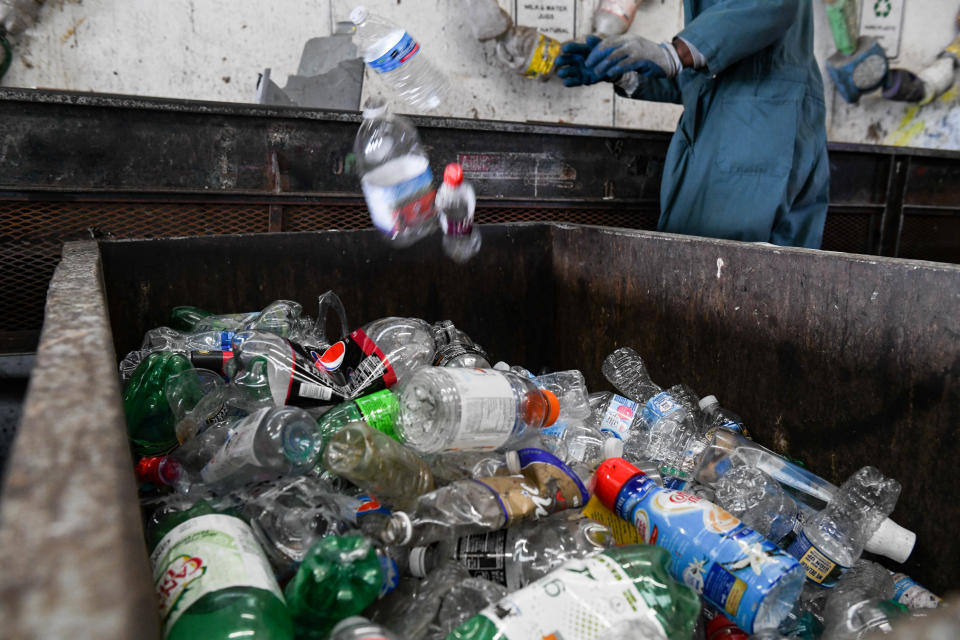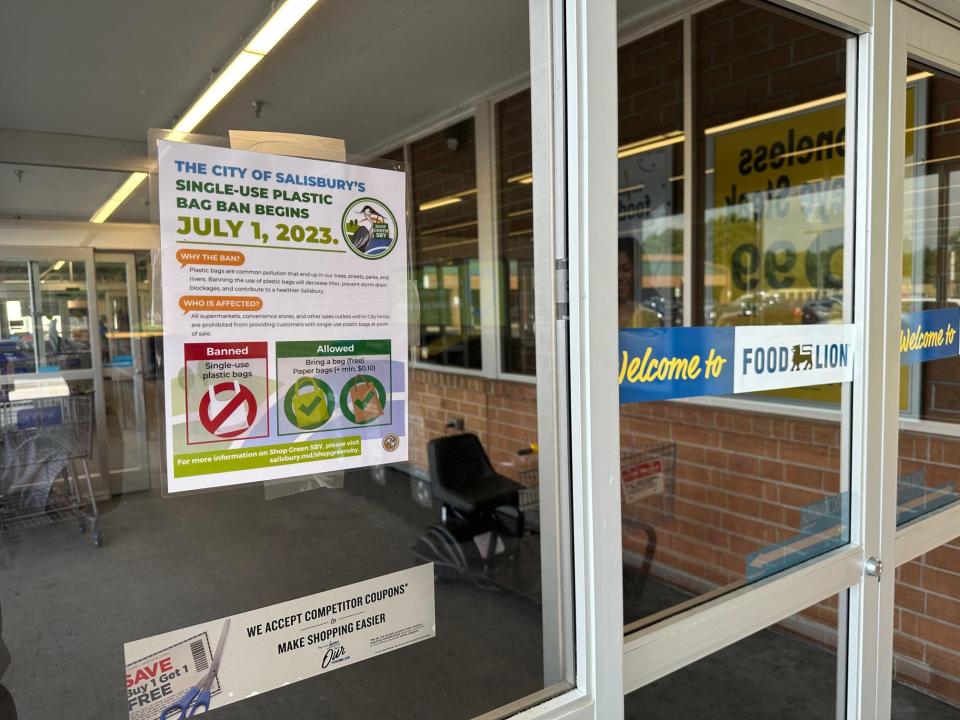Recycling costs are mounting on Eastern Shore. Here's how counties are handling it
The mounting stress of plastic pollution, costs and other challenges have led Maryland Counties to double down on recycling programs as new laws could come to their aid.
Eastern Shore recycling programs in Wicomico, Somerset, and Worcester counties have not been immune to economic factors like a disintegrating plastic market, added demand for the recycling of other renewable materials and lack of a workforce to separate the plethora of waste.
"This county doesn't separate recycling costs into commodities and has it in the budget as a whole," said Robert Keenan, Worcester County recycling manager. "For this year, we've (allotted) $924,000, and that is an increase. That's due to personnel and administrative expenses. We have 16 recycling workers who are also transfer station attendants, and three staff transfer stations in Pocomoke, Snow Hill and Berlin."
That is in addition to five unmanned drop-off locations in the county.
Items like cardboard, plastic, paper, glass, metal, and aluminum cans get collected and find their way to the main recycling center in Newark.
Recycling: A strained business model but still in high demand

After each commodity is sorted, bailed and sold at the current market price, those items that cannot be recycled often are added to the landfill along with other garbage. Ideally, the system works well, until the price for items like plastic bottoms out — leaving counties like Worcester to sell it for pennies on the dollar if at all and thus potentially lose money on recycling.
Yet the strained business model is still in high demand with the minimum state-mandated recycling rate to aim for 20% of waste. Worcester County exceeds that at 38.33%. That includes the over 510 tons of plastic the county recycled.
"The four sorters in our recycling building (process) the plastic numbered one through seven and is hand-picked, and some of the materials are used in making barriers. Instead of jersey walls, we use recycled plastic," Keenan said. "We're hoping to continue to exceed the state mandate and reaching out to local business and events to grow our numbers. We can provide bins and provide other related services. We just received 3.5 tons of aluminum cans from the Oceans Calling Festival, and 6,280 pounds of oyster shells from a Snow Hill event."
'You can save yourself the headache of wishcycling'
Wicomico County currently owns and operates the Newland Park Landfill in Salisbury, a site which covers approximately 125 acres. The facility on a daily average processes 290 tons of solid waste along with a regional recycling facility that processes recyclable materials for end users.
"Not all plastic is recyclable, including the thin kind you get at big box stores," said Jennifer Albero, the county's recycling coordinator to Delmarva Now in 2022. "The only plastic we can recycle here that we can find a market for are narrow-neck containers with a one or a two in the recycling triangle. The rest of it with any other number is garbage. You can save yourself the headache of wishcycling."
More on "wishcyling" 'Wishcycling': Here's what you throw in recycling bin that actually ends up in landfills
In addition, it also operates 11 convenience centers, (that accept recyclables) and nine recycling convenience drop-off centers.
For its part, Somerset County's Solid Waste & Drainage is responsible for landfilling, recycling and mulching operations as well as improving drainage.
Its fleet consists of 16 tagged vehicles, 11 pieces of specialty equipment and one implement. The normal workforce is approximately 20 employees. The Solid Waste & Drainage Complex is located in Westover and includes a recycling building, scale house, landfill, borrow pits, leachate storage tank and mulching center. There are also six transfer stations, four county dumpsters and an incinerator located throughout the county.
What are eco-modulated fees and who pays them?

The ubiquitous nature of plastic products, and the increasingly highlighted dangers of microplastics in a range of goods, has prompted national groups to start holding producers accountable financially for the lifecycle of what they create.
That includes offsetting some of the costs for recycling and waste disposal by having them pay into a fund to help states deal with plastic pollution.
"Plastics have the unenviable detail of being visible pollution in our community and microscopic pollution in microplastics in everything from textiles to paint," said Scott Cassel, CEO of the Product Stewardship Institute in Boston. "The challenge is reducing that pollution since it can enter our bodies and the other is the lack of viable markets for many of those products. That could be the volume that's able to be collected and the lack of markets comes from contamination within that plastic. The third challenge is knowing what can actually be recycled."
According to the institute, change on the producer's side comes with financial incentives to create a clean product stream. Much of those external costs to recycle or dispose of the plastic falls on states or much smaller municipalities.
More on plastic bag bans Salisbury passes plastic bag ban in unanimous vote: What you need to know
"We need a sustainable playing field, which is developed through extended producer responsibility systems. These laws are will still allow producers and brands to compete," Cassel said.
Eco-modulated fees are charged to brands that pay into funds they will manage and will allow for:
more sustainable selection of materials that are charged a fee in accordance to its environmental sustainability,
a more sustainable amount of plastic material that is sold into the market,
a realistic system cost, or what is actually costs states and municipalities pay to recycle or dispose of the plastic depending on that commodity market, and finally,
offsetting state costs overall for plastic production.
Maine, Oregon, Colorado, and California already have such laws for product producers on the books, with a dozen more states proposing such legislation.
"Of Maryland, Delaware, and Virginia, Maryland is furthest ahead in getting these types of laws passed. They've had very good versions of this law introduced for the past couple of years and still faced some issues with legislative consensus. So lawmakers are beginning a needs analysis of these fees to product producers," Cassel said.
The problem of plastic: 'It's inherently unrecyclable'

Regional organizations like the Environmental Integrity Project are among those citing plastic as a threat to clean waterways in the state and especially the Eastern Shore.
Alexandra Shaykevich, a research analyst for the project, noted plastic production requires fossil fuels and is very energy intensive, complete with a bevy of greenhouse gasses and other emissions associated with its creation. Among them are ethane and later ethylene.
The byproduct is often found in something as common as a plastic cup. It is so potent, Shaykevich noted, for every 1 million tons of ethylene, there is equally 1 million tons of greenhouse gases.
"There really isn't an optimal disposal of plastic," Shaykevich said. "It's inherently unrecyclable and there's so many types of the material for different uses and so many additives to it. That makes it very difficult to prepare it for recycling. What we have to do is change the way we consume it and create new mechanisms for (producers). "
A 2018 Environmental Protection Agency report even cited that of the 37.8 million tons of plastic created yearly, only an estimated 9% actually gets recycled.
More on Ocean City and no recycling Why Ocean City won't return to recycling program despite controversy
This article originally appeared on Salisbury Daily Times: How Eastern Shore counties are keeping up with challenges of recycling

